- Home
- Jerry Spinelli
Loser Page 4
Loser Read online
Page 4
11. Mailman
In the spring Mrs. Biswell is certain that Zinkoff will be absent at least one day: Take Your Kid to Work Day. The boy is forever blabbing about his father the mailman and that he himself is going to be a mailman when he grows up. Surely he will want to go to work with his father that day.
The teacher is both right and wrong. Zinkoff definitely wants to miss school on Take Your Kid to Work Day, but the post office will not allow children to accompany postal parents on their routes. They say it is too dangerous and, besides, the mail Jeeps have only one seat.
Zinkoff has been begging his father for years to take him to work. Now, the thought of watching other kids go off to work with their parents while he stays behind is too painful to bear. Every day he pesters his father.
“I can’t,” says his father. “They’ll fire me. Do you want them to fire me?”
The youngster can only shake his head and pout. And the pestering starts all over.
Days of this.
At last Mr. Z has an idea.
“Okay, okay,” he says. “I can’t take you to work officially. I can’t take you on a workday. I can’t take you in the Jeep. So here’s what we’ll do…”
When Zinkoff hears his father’s plan, he rushes next door to tell Andrew.
“I’m having my own day. Take Donald Zinkoff to Work Day. It’s going to be on Sunday. Now I can do it and my dad won’t get fired.”
“I’m going with my dad on the real Take Your Kid to Work Day,” says Andrew.
“My dad’s a mailman,” says Zinkoff. “I’m going to deliver mail.”
“My dad’s a banker,” says Andrew. They are in Andrew’s backyard. Andrew is batting a Ping-Pong ball against the wall with his mother’s pancake spatula. He borrowed the Ping-Pong ball from Zinkoff weeks before. “I’m going to make money.”
“I’m going to ride in my dad’s clunker.”
“I’m going to ride to work on the train. All the way to the city.”
“I’m going to carry my dad’s mailbag. He says it’s really heavy, but I’m going to carry it.”
Andrew turns and whacks the ball as hard and high as he can. It sails to the Zinkoffs’ roof and rolls into the rain gutter. “I’m going to sit at my dad’s desk. He said I can even sit in the vice president’s chair.”
Zinkoff stares up at the rain gutter. That was his only Ping-Pong ball. “I’m having lunch with my dad. We’re going to eat right there in the Clunker.”
“We’re eating lunch in a restaurant. Sometimes the mayor goes there. My dad says when he gets a raise, we’re outta here. He says we’re never coming back to this dump.”
Zinkoff looks around. He doesn’t see any dump. He wonders what dump Andrew’s father was talking about. He can’t look up at the rain gutter without the sun blinding him.
When the official Take Your Kid to Work Day arrives, Zinkoff watches Andrew go off to the city with his dad. Andrew wears a suit and tie. He looks like a little banker.
Two days later, Sunday, is Take Donald Zinkoff to Work Day. To prepare for the day, Zinkoff’s dad has brought him a tall stack of envelopes and sheets of paper. Since there is no official mail to deliver on a Sunday, Zinkoff has to make his own mail. He writes letters. Forty, fifty, sixty letters and more. He writes words that he imagines people say in letters. He feels really grown-up because the sheets of paper have no lines. He folds up the letters and puts them in the envelopes. He draws stamps in crayon in the upper right corners of the envelopes and writes addresses and puts the finished letters—one hundred of them!—into the mailbag.
The Zinkoff family goes to church early that Sunday. Two minutes after they get home, the town’s newest mailman is ready. He takes the lunches from the refrigerator. They were packed the night before in two brown paper bags. He lets his dad carry the lunches. Himself he harnesses to the great leather bag. It hangs down to his heels. He hauls it across the living-room floor, out the door, down the front steps and across the sidewalk to the Clunker. Somehow he manages to sit in the car with the mailbag on his back.
Mr. Zinkoff is determined to make the day live up to his son’s expectations. He knows Donald expects to travel a respectable distance to work, so he drives around for fifteen minutes before pulling into the empty parking lot of a dentist three blocks from their home. The street is called Willow.
Donald jumps from the car and starts off. His father grabs him. “Whoa there, Nellie.”
He gives his son instructions. Start with the dentist. One letter to each house. No peeking in the mail slots. Act professional.
“What does ‘act professional’ mean?” Donald wants to know.
“It means behave like a grown-up doing a job. That’s what you’re getting paid for.”
The boy gawks at his father. “I’m getting paid?”
“Sure. End of the day. Five bucks.”
“Five bucks!” Donald tries to leap for joy, but the mailbag holds him down.
“And one more thing,” says his father. “You can’t be a real mailman without this.” He reaches into the backseat and pulls out a hat. And not just any hat. His own mail carrier hat. The postal blue, strawlike pith helmet that he wears on hot summer days with his Bermuda shorts uniform.
Donald is popping with pride. He puts on the helmet. Of course, it’s too big and comes down to his ears and nose, but he couldn’t care less. He adjusts the helmet as best he can and staggers off to the dentist’s door, the mailbag thumping against his heels. The helmet wobbles on his head.
He stops, turns. He calls, “And one more thing, Dad.”
“What’s that?”
“Be friendly. Mailmen are always friendly.”
“That’s right. Now get to work.”
The dentist’s mailbox is at the edge of the parking lot. Donald swings the bag around so he can reach inside, grabs a letter and places it in the box. He turns to his father in the car and raises his hands in triumph. “Yes!”
Ninety-nine to go.
He starts off down the block. A few of the houses on Willow are single homes with porches. The rest are brick row houses like his own. Some have mailboxes fixed to a railing. Some have slots in the front doors.
The first house has a slot. Donald slips a letter through. He listens for it to land but he cannot hear it. The slot is eye-high. Quietly, with his finger, he pushes in the swinging brass flap. He takes off his helmet and scrunches his eyeball to the slot and strains to see the letter on the floor. All he can make out is a green carpet. He looks around some more, hoping to spot something interesting, but all he sees is an ordinary living room with furniture and a picture on the wall of four basset hounds playing cards.
“No peeking!”
His father’s voice pierces the jungle cat grumble of Clunker Four, prowling slowly along in the street. Donald lets the brass flapper swing down. He replaces his helmet and goes back to work.
He discovers one thing right away: It is usually more fun to deliver mail to a door slot than to a mailbox. With a mailbox, no one even knows you’re delivering. But with a slot, you’re dumping the letter smack into the people’s house, and sometimes they’re right there on the other side of the door and you can hear them.
“Mommy! Mommy! We got mail!” he hears on the other side of one door. He pauses on the front steps to listen.
“There’s no mail on Sunday,” comes a mother’s cranky reply.
“Yes, there is! There’s mail on Sunday! Look!”
Donald walks off smiling. He feels like Santa Claus.
At another house, just as he is about to push a letter through the slot, the door opens. Standing there is a two-year-old wearing nothing but a diaper and a mouth smeared with chocolate.
They stare at each other for a while, then Donald says, “Mailman,” and holds out the letter.
“Moommsh,” says the two-year-old. Donald can’t tell if it’s a boy or girl. Whichever, its cheeks are bursting with food. The air is heavy with peanut butter.
�
�You take it,” says Donald. “Maybe it’s a letter for you.”
The two-year-old takes it in chocolaty fingers. Suddenly he or she turns and runs, crying out, “Moommsh! Moommsh!”
Donald pulls the door shut.
Several houses later a kid is sitting on the top step. He looks like he’s mad at somebody. The mailbox is bolted to the brick wall under the house numbers. Donald isn’t sure what to do. Should he put the letter in the mailbox, or give it to the kid? But what if the kid doesn’t live here?
“Do you live here?” says Donald.
The kid gives him a glare but no answer. The Clunker grumbles in the street.
Donald decides the kid probably does live here. He further decides that the professional thing to do will be to put the letter in the mailbox. He is reaching out to do so when the kid snatches the letter from his hand.
The kid looks at the envelope. He makes a face. “This ain’t no letter.”
“It’s a letter,” says Donald. “I’m delivering the mail. Look. This is my dad’s mailbag.”
“This ain’t no letter,” the kid repeats. His lip curls into a sneer when he says the word “letter.” “This ain’t no stamp. It’s crayon. This ain’t no address. You can’t even read it.” He rips open the envelope. “And this ain’t writing. It’s scribbles.” He rips the letter in half and stuffs it back into the leather bag.
Donald knows he’s supposed to deliver the mail despite rain, sleet or snow—but what about mean big kids who tear your letter in pieces?
He turns his eyes to Clunker Four. His father gives him a thumbs-up and points to the next house.
Donald remembers: Be friendly.
He gives the kid his best smile. “Nice to meet you,” he says and moves on.
Behind several doors he hears dogs barking. Behind another he hears a language he doesn’t recognize. He hears bits and pieces of words and people sounds, and, once, a noise that sounds exactly like that of a flying dinosaur he saw in the movies, but of course that couldn’t be.
Each time he tries to sneak a peek through a mail slot, his father calls “No peeking!” But he can’t help himself.
There is a minute or two during which he has a strange thought. Actually he doesn’t really have the thought. His mind is trying to catch the thought as a cat tries to catch a shadow. The thought, if he could catch it, would go something like this: Behind the front doors of houses incredible, impossible things are happening, and as soon as you lift the mail flapper they all disappear and all you see is an ordinary living room.
When he comes to the last house in the second block—fifty-six homes so far and one dentist—his father calls out, “Lunchtime!”
12. The Nine Hundred Block of Willow
His father parks the Clunker, and they sit in the front seat having lunch. Donald has given much thought to lunch. On an ordinary day he might have packed a peanut butter and banana sandwich and a pack of M&M’s and a strawberry Twinkie. But that is not what a mailman would eat. So he made himself a sandwich of Lebanon baloney and cheese and lettuce and pickle chips and mustard. For dessert he chose an apple. He wanted to bring coffee in the thermos jug, but his mother would only allow decaffeinated iced tea.
It’s the best lunch he’s ever had, sitting in Clunker Four with his dad, pith helmet and leather bag waiting in the backseat. He pours iced tea into the red plastic cup and pretends it’s coffee.
He eats half his sandwich, two bites of the apple and a sip of iced tea. As he opens the car door his father says, “Where are you going?”
“Back to work,” says Donald. He can’t wait. He’s too excited to eat.
“Close the door. Relax,” says his father. “You don’t just wolf down your lunch and run off. Lunchtime is not for eating. Working man needs a break.”
Donald closes the door. He sits back. He folds his arms. He looks at the ceiling. He whistles.
His father laughs. “Are you relaxing?”
“Yep.”
“Well, we don’t just relax. We talk too. We have a chat.”
“What do we chat about?”
“Anything we want.”
Donald doesn’t have to think long. “Dad,” he says, “do you think it’s going to snow?”
“Someday, sure, next winter. But not today. We got a warm day in April here.”
“Oh,” says Donald. “How about rain?”
Mr. Zinkoff looks at the sky. “Doesn’t look like it.”
“Hail?” Donald says hopefully.
“Sorry.”
Donald punches the seat cushion. “Phooey.”
To Donald, one of the best things about being a mailman is that you have to deliver the mail in spite of snow, rain, hail and, for all he knows, tidal waves and tornadoes. In fact, it was on a day when he saw his father come home with icicles hanging from his earmuffs that he decided to become a mailman. He watched his father shake the snow and ice from himself, and he said, “Wow, Dad! Was it hard?” He has never forgotten the answer. His father picked an icicle from his hat, stuck it in his mouth like a toothpick and said, “Nah. No problem. Piece a cake.” From that day on, when he sees stormy weather out the classroom window, he thinks of his dad trudging heroically through the blizzard saying, “Piece a cake…piece a cake…”
The night before, Donald went to bed fervently wishing for a blizzard the next day. When he awoke he ran to the window and was met by pure sunshine. He searched sky and ground for evidence of bad weather, but could not find so much as a solitary hailstone.
“But you know,” says his father, “weather isn’t the only thing you have to worry about.”
“It’s not?”
“No way. There’s biting dogs and wild cats. There’s banana peels you can slip on. There’s turtles you can trip over and break your nose. There’s rhinos.”
Donald boggles. “Rhinos?”
“Sure. Who says a rhino can’t escape from the zoo and show up on your mail route? Do you know of any law that says that can’t happen?”
Donald couldn’t think of a single law against it. “I guess not,” he says.
His father nods. “There you go. It’s a dangerous world out there. A mailman has more than just snow and rain to deal with.”
Donald beams. “Yahoo!” He looks out the window, relieved to know the world is not as safe as it appears to be. “Is lunchtime over yet, Dad?”
Mr. Z consults his watch. “Almost. Just enough time to talk about the Waiting Man.”
Donald stares. “Huh?”
“The Waiting Man. You’ll see him in the next block, the nine hundred block. Nine twenty-four Willow. You can see him in the window behind the mailbox.”
Donald is intrigued. “Is he waiting for the mail?”
“No, he’s waiting for his brother. I hear he’s been waiting for him for thirty-two years. His brother went away to fight in the Vietnam War and was MIA and never came back.”
Donald senses a sadness somewhere in the distance. “What’s ‘MIA’?”
“Missing in action. It means they’re pretty sure he was killed but they can’t find his body.”
“Are you pretty sure, Dad?”
His father looks out the window. He nods slowly. “I’m pretty sure.”
“Isn’t the Waiting Man pretty sure?”
“I guess not.”
Thirty-two years. Donald cannot imagine it. Donald cannot wait more than thirty-two seconds for anything. Of course, a brother isn’t just anything. Thirty-two years. Would he wait that long for a brother? Would he wait that long for Polly?
His father claps his hands. “Okay. Enough of this chitchat. Time to hit the trail. Let’s go! People are waiting for their mail!”
Donald scrambles into the backseat. He straps on the bag, plunks on his helmet and hits the sidewalk.
As it turns out, no escaped rhinos are out and about this particular day. No turtles either. Not even a banana peel. But Donald does see the Waiting Man. He’s a face in the window next to the numbers white against th
e brick: 924. He appears to be wearing pajamas. His white hair is thick around his ears and wispy on top. He is looking up the street, in the direction that Donald came from. When Donald stands on the top step, he is close enough to reach out and touch the window. But the Waiting Man does not turn, does not seem to know Donald is there. He merely stares unblinking up the street.
Donald watches the Waiting Man for much longer than he realizes. He does not move away until, in his own mind, he has waited longer than he had ever waited for anything in his life.
He is at the next house before he realizes he has forgotten something. He rushes back to deliver 924 its letter. The Waiting Man is still there.
Several houses later Donald hears someone behind him calling: “Mailman! Oh mailman!”
He turns. He has to lift his head to see out from under the brim of the pith helmet.
A white-haired lady in a mint-green dress is standing on a step waving her letter. She is surrounded by a four-legged aluminum walker. She’s smiling at him. “Thank you, mailman!” she calls.
Donald calls back, “You’re welcome!” He stands at attention and salutes her.
Shortly after that comes a moment Donald has not expected. He reaches into the bag and feels nothing but leather. He takes it off and puts it on the sidewalk and peers into it. Nothing. Empty. He has delivered his one hundred letters. Many times he has imagined the start of Take Donald Zinkoff to Work Day; never has he imagined the end of it.
Clunker Four grumbles at the curb.
“Workday’s over,” calls his dad. “Time to go home.”
Reluctantly Donald drags the bag to the car. He gets in. He does not take off the helmet. His father gives him his day’s pay. He puts it in his pocket without looking at it. He cries all the way home.
13. Waiting
Andrew’s father must have gotten a raise, because by the time Zinkoff enters third grade, Andrew is gone. Moved. To a place outside of town called Heatherwood. To a house with a driveway and a front yard with a tree, Zinkoff hears.

 Who Put That Hair in My Toothbrush?
Who Put That Hair in My Toothbrush?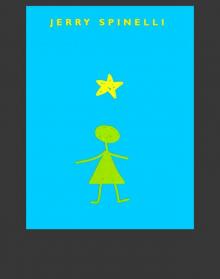 Stargirl
Stargirl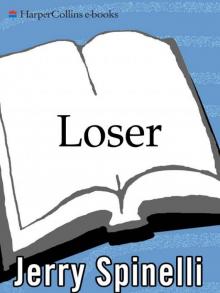 Loser
Loser Jake and Lily
Jake and Lily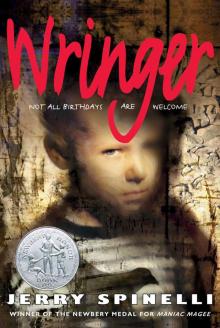 Wringer
Wringer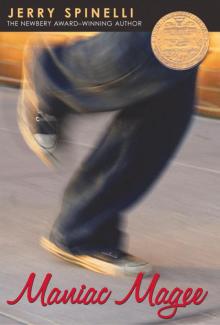 Maniac Magee
Maniac Magee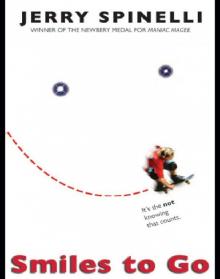 Smiles to Go
Smiles to Go Love, Stargirl
Love, Stargirl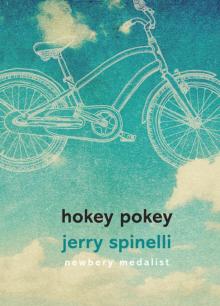 Hokey Pokey
Hokey Pokey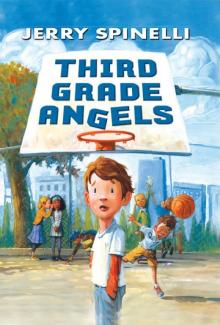 Third Grade Angels
Third Grade Angels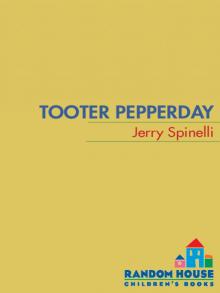 Tooter Pepperday: A Tooter Tale
Tooter Pepperday: A Tooter Tale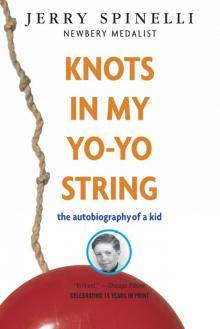 Knots in My Yo-Yo String Knots in My Yo-Yo String
Knots in My Yo-Yo String Knots in My Yo-Yo String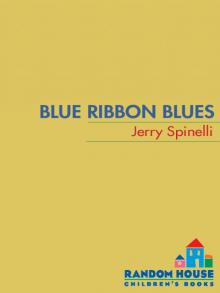 Blue Ribbon Blues: A Tooter Tale
Blue Ribbon Blues: A Tooter Tale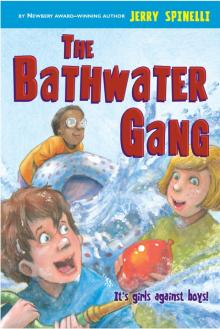 The Bathwater Gang
The Bathwater Gang Crash
Crash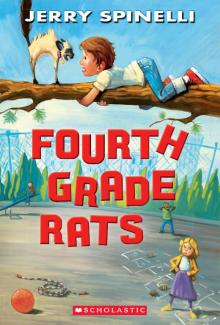 Fourth Grade Rats
Fourth Grade Rats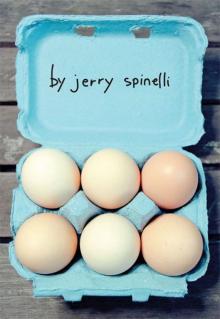 Eggs
Eggs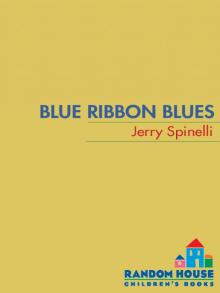 Blue Ribbon Blues
Blue Ribbon Blues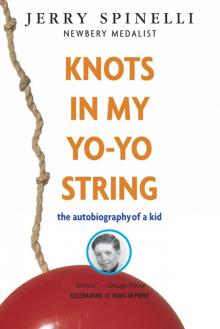 Knots in My Yo-Yo String
Knots in My Yo-Yo String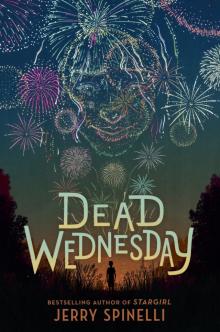 Dead Wednesday
Dead Wednesday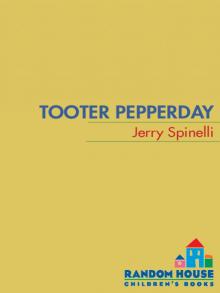 Tooter Pepperday
Tooter Pepperday